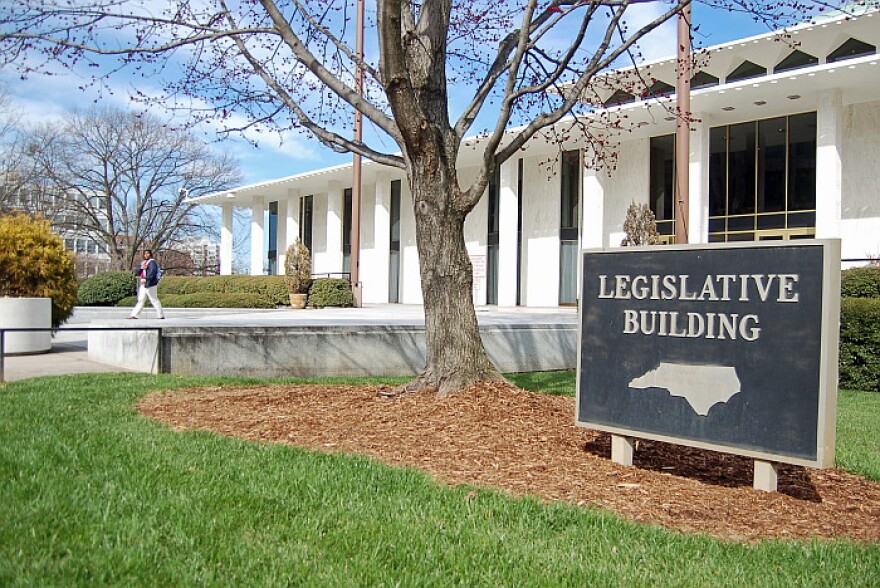Lawmakers adjourned for the year early Saturday morning following a short session at the General Assembly marked with limited acrimony, plenty of debate over House Bill 2 and the departure of several long-serving members.
At the end of the 10-week session, legislators passed a new state budget, amended a non-bathroom provision of House Bill 2, and headed off to the campaign trail with a number of outstanding policy measures left to die.
Here's a breakdown of some of winners from this year's session:
State Budget
Adjusting the two-year state budget is the most significant task for policymakers during the even-year sessions.
On Friday, House representatives gave final approval to a $22.34 billion fiscal blueprint. The bill includes an average 4.7 percent raise for public school teachers, a more modest salary increase for state employees and additional changes to state tax policy.
Married couples filing jointly will see the standard deduction increase from $15,500 to $17,500 over the next two years. Republicans also sent $475 million to the state’s rainy day fund.
Republicans touted the budget as a fiscally-sound conservative approach to state spending and preparation for the next economic downturn. Some Democrats said the budget didn’t do enough for teachers of more than 30 years, state retirees or pre-K programs.
Higher Education
Education comprises the largest portion of the state budget. Lawmakers mandated a tuition cap of $500 per semester at Elizabeth City State, UNC-Pembroke, and Western Carolina.
At the same time a new measure will lock tuition rates across the UNC system in place for eight semesters.
Charter Schools
The General Assembly also sent the Governor a bill that would turn five low-performing traditional public schools over to charter school management operations.
The move would place the struggling schools in an Achievement School District program. A similar type of initiative in Tennessee has not met expectations set forth by lawmakers there. Republicans here say their plan will improve on those efforts.
Coal Ash Cleanup
Lawmakers and the Governor reached an agreement on coal ash cleanup. Under the measure, Duke Energy would have to provide a permanent drinking water source to residents living near coal ash pits. In return the nation’s largest utility would have storage sites at seven locations reclassified from intermediate to low-risk.
Environmentalists called the agreement a sweetheart deal that went against previous, tougher standards.
Leading Republicans and Governor McCrory avoided another lawsuit with the deal. McCrory has successfully sued senate leader Phil Berger (R-Rockingham) and House Speaker Tim Moore (R-Cleveland) for usurping his power.
There were also policy proposals that didn’t move, were relegated to committees or were never given a vote including:
Bathroom provisions in House Bill 2
It was unlikely that lawmakers, after calling a special session, hastily passing the measure and then defending it amidst months of national criticism, would undo the most contentious piece.
There were no changes to bathroom guidelines. HB2 also established a state wide non-discrimination policy that did not include the LGBT community. Some critics had called for changes to HB2 that would have implemented federal workplace or housing protections. The only change to HB2 was restoring the ability to sue in state court over employment discrimination.
Regulatory reform
Since Republicans took over both chambers in 2011, an annual bill rolling back environmental regulations has been passed. However, this year’s debate over environmental protections and a business-friendly culture never fully developed.
Lawmakers were debating a series of other bills, trying to conclude the session and couldn’t come to an agreement over which regulatory laws to undo. Environmentalists said the lack of action was a momentary victory, or at least a delay until of deregulation until next year.
Wind Farms
This proposal would have banned wind farms and cell towers from going up in large portions of the state. Senate majority Leader Harry Brown (R-Onslow) is likely to pursue limiting construction of these renewable outposts.
Sanctuary cities
Lawmakers debated a measure that would have punished municipalities for accepting identification cards issued by local government or nonprofit organizations. House Bill 100 proposed taking away funding for road and school construction, if municipalities were serving as so-called sanctuary cities. The measure died in the House.
Constitutional amendments
A bill that would have asked voters to weigh-in on several amendments to the state constitution did not move through both chambers. Senate Republicans were seeking a cap on state income taxes of 5.5 percent and changes to eminent domain.
North Carolina has 20 amendments since the 1971 revision to the state constitution. Other states, for comparison, have many more. Alabama has 900 constitutional amendments, California about 500. The U.S. has 27.
Prominent Retirements
The session also marked the retirements of some powerful lawmakers. Senate Rules Chairman Tom Apodaca (R-Henderson) has served as Berger’s fiercest ally in recent years. He is expected to work as a lobbyist beginning in January. Bob Rucho (R-Mecklenburg) has been a leading architect to tax reform in the state. Both have been colorful, candid, conservative mainstays in the Senate and leave major leadership holes for the 2017 long session.
In the House, Pro Tem Paul "Skip" Stam (R-Wake) is not running for re-election. And Leo Daughtry (R-Johnston), a former majority and minority leader, is also retiring.











